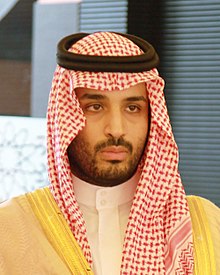2017 Saudi Arabian anti-corruption arrests

Crown Prince Mohammad bin Salman, head of the Saudi Anti-Corruption Committee which ordered the arrests
|
|
| Date | 2017 |
|---|---|
| Location | Saudi Arabia |
| Type | Governmental purge |
| Motive | Disputed |
| Arrest(s) | 500 |
A number of prominent Saudi Arabian princes, government ministers, and business people were arrested in Saudi Arabia in November 2017 following the creation of an anti-corruption committee led by Crown Prince Mohammad bin Salman (also known as MbS).
There are three alternate theories regarding the motives behind the purge: a genuine corruption crackdown, a project to gain money, or preparing to take over the crown.
The detainees were confined at the Ritz-Carlton hotel in Riyadh (which hosted the announcement for the planned city of Neom on 24 October 2017), which subsequently stopped accepting new bookings and told guests to leave. Private jets were also grounded to prevent suspects from fleeing the country.
The arrests resulted in the final sidelining of the faction of the late King Abdullah and MbS's complete consolidation of control of all three branches of the security forces, making him the most powerful man in Saudi Arabia since his grandfather, the first King, Ibn Saud.
As many as 500 people have been rounded up in the ongoing sweep. Saudi Arabian banks have frozen more than 2,000 domestic accounts as part of the crackdown. According to the Wall Street Journal, the Saudi government is targeting cash and assets worth up to $800 billion. The Saudi authorities claimed that amount is composed of assets worth around $300 billion to $400 billion that they can prove was linked to corruption.
Attorney General Sheikh Saud Al Motjeb said in a statement that the arrests were “merely the start of a vital process to root out corruption wherever it exists.” He added that those detained will have access to legal counsel and pledges to hold trials “in a timely and open manner.” Meanwhile, King Salman appointed 26 new judges.
MbS stated that “We show them all the files that we have and as soon as they see those about 95 percent agree to a settlement...About 1 percent are able to prove they are clean and their case is dropped right there. About 4 percent say they are not corrupt and with their lawyers want to go to court.” When asked about reports of cash and assets totaling $800 billion that belong to the people accused of corruption, the official said, "Even if we get 100 billion back, that would be good."
...
Wikipedia
